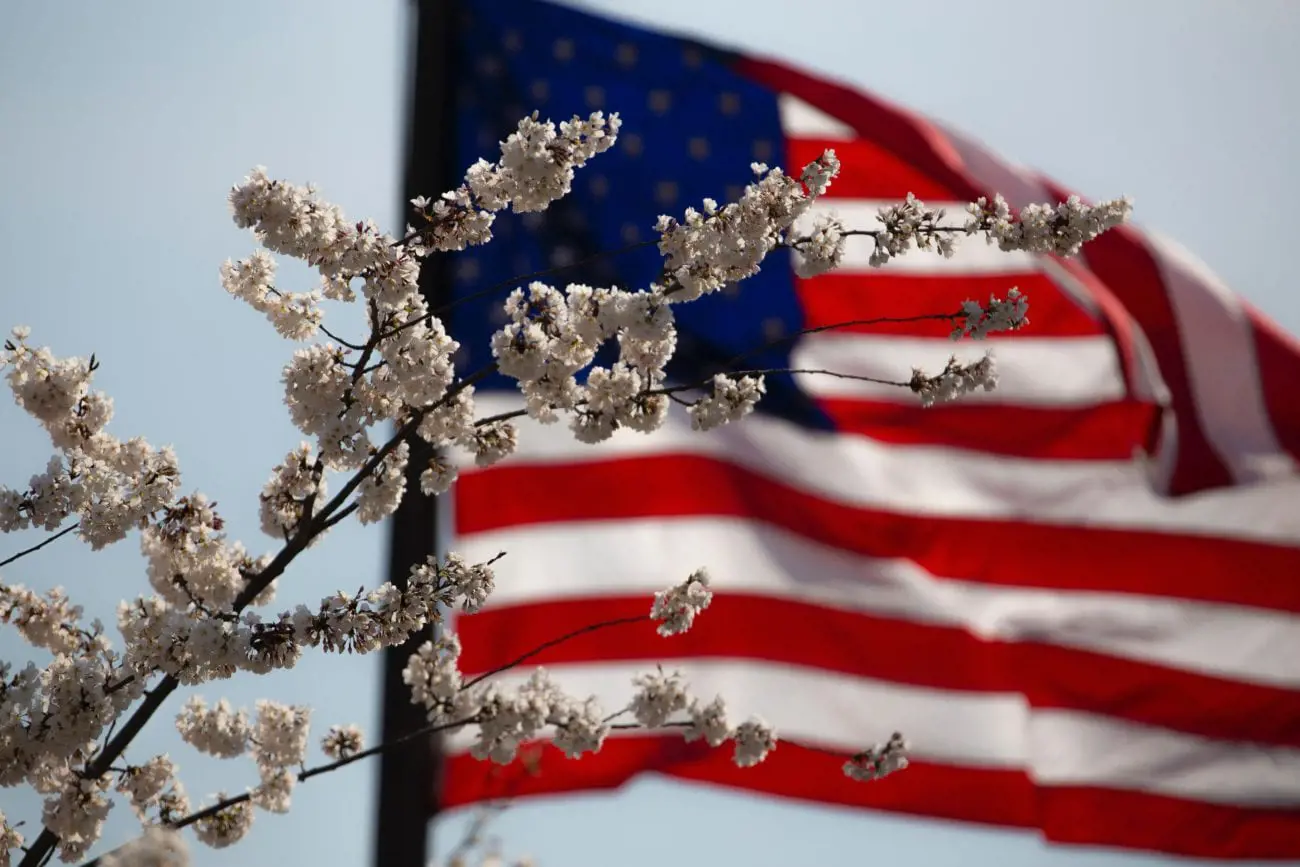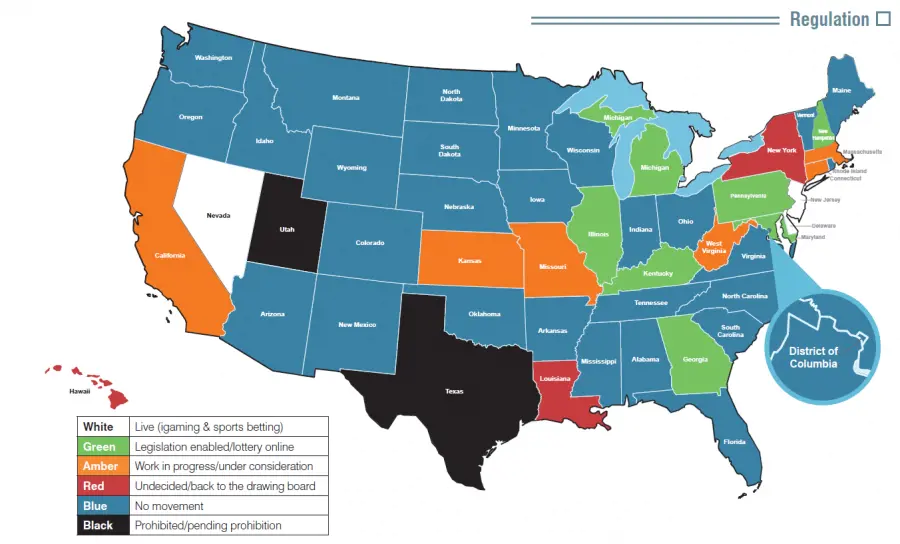State of the Union: the latest developments in the US
The State of the Union, in partnership with Segev LLP, covers the latest regulatory developments across the US. This week pressure has been ramped up on the Department of Justice in the wake of its revised Wire Act opinion, South Dakota and Minnesota are considering sports betting bills and Arkansas is thrashing out sports betting regulations, while Illinois' new Democrat Governor has factored sports betting into his 2020 budget.

The State of the Union covers the latest regulatory developments across the US. This week pressure has been ramped up on the Department of Justice in the wake of its revised Wire Act opinion, South Dakota and Minnesota considering sports betting bills and Florida looking to ban online lottery sales.
New Hampshire challenges against DoJ’s Wire Act opinion New Hampshire has launched a legal challenge against the US Department of Justice's (DoJ) revised opinion on the Wire Act, arguing that the new stance is not faithful to the text, structure, purpose, or legislative history of the legislation.
The lawsuit has been filed on behalf of the New Hampshire Lottery Commission, with the support of state Governor Chris Sununu and Attorney General Gordon MacDonald. It claims the stance is beyond the Department of Justice's powers to enforce, and demands a declaratory judgement setting out the rights of all parties involved, and to an order vacating and setting aside the 2018 opinion.
It claims the interpretation would expose the state lottery to “substantial uncertainty as to the continued legality of its operations, which fund New Hampshire’s public education system”. The suit noted that the New Hampshire Lottery relied on duplicate computer gaming systems located in other states to ensure that operations would not be halted by natural disasters, and that industry regulations require it to operate via these out-of-state systems at least twice a year. This, it said, would become illegal under the revised opinion.
Furthermore, it added, multi-state offerings such as Powerball, Mega Millions and Lucky for Life would also be impacted by the revised ruling. Its advertising would also be affected, with its website not geolocked to New Hampshire, and advertising via email, social media going to out-of-state recipients.
Should the revised opinion be taken at face value, the lawsuit adds, it could lead to the shut-down of the New Hampshire Lottery, which would result in the state seeing a shortfall in education funding of around $90m a year. Should internet communications be banned by the opinion, this could cut sales by around 25%, and if multi-state games such as Powerball were banned, lottery revenue could be reduced by up to $80m per year, with funding for good casues falling by $40m (£31m/€35.4m).
Speaking about the challenge, Governor Sununu said: “New Hampshire is taking action to protect public education in New Hampshire. The opinion issued by DOJ puts millions of dollars of funding at risk, and we have a responsibility to stand up for our students.”
MGM CEO slams Wire Act opinion MGM Resorts International chief executive Jim Murren has attacked the Department of Justice’s revised stance on the Wire Act, dismissing it as "an absurdly, poorly-written and unenforceable opinion”.
The language of the opinion, Murren said, would suggest that the interstate lottery game Powerball, which is live in 44 states, would effectively become illegal.
“[I] don't think anyone in […] the gaming industry [or] the sports betting industry, feels any differently,” he said.
South Dakota sports amendment passed The South Dakota Senate has given its approval to an amendment that would legalise sports betting in one of the state's main cities.
Senate Joint Resolution 2 (SJR2) would amend the state’s constitution to allow its residents to place legal wagers on sporting events from inside the city limits of Deadwood in the far west of the state.
The Senate voted 18-14 in favour of the SJR2 and the amendment was passed on to state’s House for a first reading. SJR2, which was introduced last month, will now face the House Committee on State Affairs.
Although details on the proposed changes in law are yet to be published, SJR2 states that the amendment must be put to voters at the next general election in South Dakota before coming into law.

Minnesota considers move to allow tribal betting Lawmakers in Minnesota are to consider a new bill that could lead to the legalisation of sports betting at tribal casinos in the US state.
Introduced by Representative Pat Garofalo, the new Safe and Regulated Sports Gambling Act of 2019 sets out plans to create the Minnesota Sports Wagering Commission, which would regulate the state’s sports betting market.
The bill would permit in-person sports wagering at casinos runs by recognised tribes in Minnesota, while consumers would also be able to place bets via mobile and other electronic devices on-site. The bill requires any mobile app to block access to consumers if they are more than 20ft away from a tribal property.
The new Commission would be able to award two types of licences: a sports pool licence and a mobile and electronic sports pool licence, with casinos permitted to apply for both types of licences. The bill does not set out the cost for either licence.
Operators would face something of a unique tax structure. An excise tax of 0.5% would be imposed on each wager placed in the state, and if the bill were to come into law, it would be the first sports betting tax of its kind in the US.
Florida Representatives move against online lottery sales Florida lawmakers will this week run the rule over a bill that could lead to an outright ban on the sale of lottery tickets and games online.
Introduced by Representative William Cloud Robinson, House Bill 629 sets out plans to prohibit consumers from playing games or purchasing lottery tickets via a personal electronic device, limiting them to physical tickets only.
The legislation would apply to all mobile phones, smart phones, smart watches, tablets, laptops, desktops and any other devices that can connect to the internet.
The Gaming Control Subcommittee will consider the bill at a hearing on February 20. Should the bill pass into law, it would come into effect from July 1 of this year.
Intralot set for DC lottery sports betting contract Intralot is set to be awarded the contract to operate sports betting on behalf of the DC Lottery after the Washington, DC Council approved an emergency measure to bypass the public procurement process.
The DC Lottery can now start contract negotiations with the Greek betting and gaming solutions provider without the need to open the process to bids from rival suppliers such as International Game Technology (IGT) and Scientific Games.
Without the so-called sole-sourcing tenet, supporters of legal sports betting had warned that it could take three years to complete the tender process, which they claimed would have seen the state miss out on millions in revenue.
Despite Councilmember David Grosso’s vocal objections, the sports betting legislation, which was first introduced by Councilmember Jack Evans in September 2018, and the emergency measure were passed with eight votes in favour.
Four Councilmembers - Brianne Nadeau, Robert White, Elissa Silverman and Grosso - voted against the bill.
West Virginia advances igaming bill with tax hike The West Virginia House Judiciary Committee has advanced a bill that would legalise online gambling activities in the state, with an amendment requiring operators to pay a higher rate of tax than originally proposed.
Tabled earlier this month, the new West Virginia Lottery Interactive Wagering Act would allow for legal, online poker, slots, table games and other services at select venue across West Virginia.
The bill, also known as H 2934, proposed to tax licence-holders at a rate of 10% of adjusted gross interactive wagering receipts on a weekly basis. However, this has now been increased to 15% as a result of the amendment.
Push for legal betting and fantasy sports begins in Iowa Iowa lawmakers are to consider a new bill that would legalise online and mobile sports betting, as well as fantasy sports contests, in the US state.
Introduced by Senator Roby Smith, chair of the Committee on State Government, Senate Study Bill 1168 would allow for wagering on professional and collegiate sporting events at Iowa’s 19 casinos, racetracks and other gambling facilities.
Consumers wishing to bet online or via a mobile would first need to register in-person at a licensed betting venue. Players would need to be at least 21 years old in order to place legal wagers and take part in fantasy sports contests.
The bill, other than saying they will be based on gross revenue, does not set out a defined tax rate for licensees.
Arkansas university athletic directors call for new sports betting controls The athletic directors of Arkansas’ four state universities have proposed a series of controls to ensure the roll-out of sports betting in the state does not lead to any integrity related scandals.
The athletic directors of the University of Arkansas, Fayetteville; Arkansas State University; the University of Arkansas at Little Rock, and University of Arkansas at Pine Bluff warned that regulations must reflect the role that collegiate athletics would play in the regulated sports betting market.
As a result they proposed restricting certain persons from gambling, as well as types of wagers that could be exploited or infringe on the integrity of collegiate sports. To this end, they call for the list of people excluded from wagering to be expanded, and a more comprehensive definition of ‘sporting event’ to be added to the regulations.
The athletic directors also suggested mandating the Arkansas Racing Commission and casino operators to cooperate in any investigations by colleges and universities concerning illegal betting. They also called for licenses to be required to hold records of all bets placed, for at least three years.
Arkansas citizens approved a measure to permit four casinos to open in the state at last November’s mid-term election. This will see Oaklawn Racing and Gaming and Southland Gaming and Racing expand into full-service casinos, with new facilities to be established in Pope and Jefferson counties. Sports betting will be allowed at these facilities.
With 54% of citizens backing the measure, the Racing Commission was given 120 days to develop casino regulations, with a view to issuing licences by July 2019.
Illinois Governor factors betting into state budget Incoming Illinois Governor J.B Pritzker has raised hopes of legal sports betting in the state after including $200m (£153.0m/€176.1m) in future tax revenue from wagering activities in his 2020 budget proposal.
Pritzker is proposing to legalise sports betting at facilities across the state, with consumers able to place bets in-person or online. Those betting via the internet would be able to do so from inside Illinois or in a jurisdiction that has entered into a reciprocal agreement with the state.
Under Pritzker’s plans, a total of 20 sports wagering licences would be available in Illinois at a cost of $10m each, plus an annual renewal fee of $5,000. Licence-holders would pay tax at a rate of 20% on sports betting revenue.
Citing estimates from Oxford Economics, Pritzker has said Illinois could generate between $384m and $680m in gross sports betting revenue per year under full implementation. Based on the proposed 20% tax rate, this would generate tax revenue of between $77m and $136m each year.
Such is Pritzker’s confidence that legislation will pass, he has included around $17m of tax revenue in the budget forecast for fiscal year 2020, with $12m of this to be transferred into the general funds after estimated potential expenses to administer sports wagering were deducted.
The proposal states that for the first five years of operation, operators would be able to deduct up to 90% of one-fifth of the initial licence fee each year from the sports wagering tax.